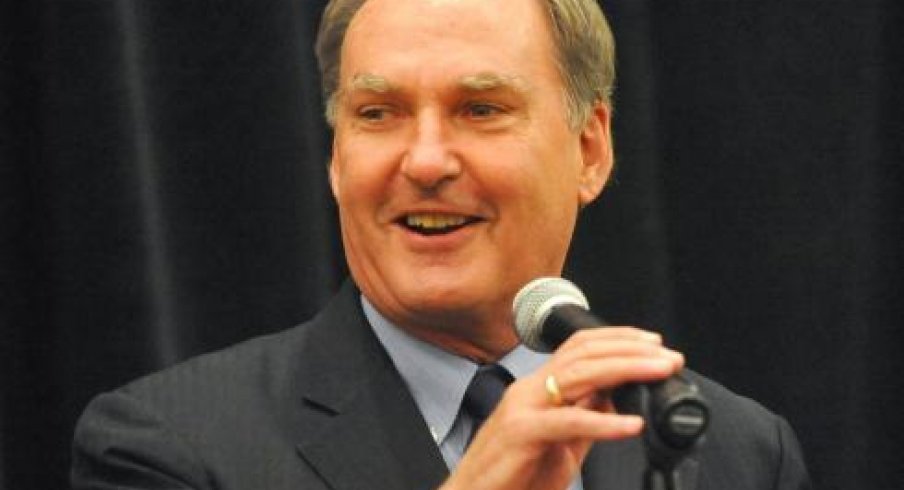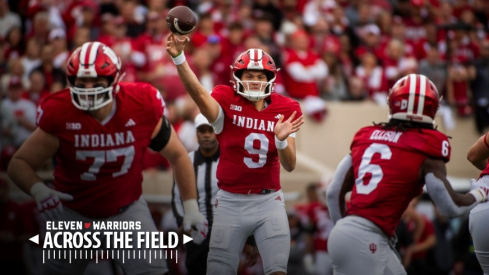There’s a famous scene in the movie Forest Gump in which the title character appears on the Dick Cavett Show alongside John Lennon. When Gump speaks of Chinese citizens lacking belongings and religion, Lennon memorably responds, “No possessions? No religion, too?”
The scene is a play on Lennon’s song “Imagine.” And on Friday, during Jim Delany’s testimony in the Ed O’Bannon-NCAA trial, one would have been apt to ask, “No Rose Bowl? No college athletics, too?” The Big Ten commissioner painted another doomsday scenario when questioned about amateurism in intercollegiate athletics.
Last year, Delany crafted a bleak picture, saying major college football would go to a Division III or Ivy League model if athletes made money off of their schools’ television contract.
“It has been my longstanding belief that The Big Ten’s schools would forgo the revenues in those circumstances and instead take steps to downsize the scope, breadth and activity of their athletic programs,” Delany wrote in a court declaration. “Several alternatives to a ‘pay for play’ model exist, such as the Division III model, which does not offer any athletics-based grants-in-aid, and, among others, a need-based financial model. These alternatives would, in my view, be more consistent with The Big Ten’s philosophy that the educational and lifetime economic benefits associated with a university education are the appropriate quid pro quo for its student athletes.”
Most people balked at Delany’s statements and rolled their eyes. He soon shied away from the comments after much criticism. But there he was again last week, this time in an Oakland, California, courtroom making head-scratching remarks.
When it comes to business ventures, Delany is usually spot-on. His off-balance stances enter the picture during debates on the current structure of college sports. But Delany’s answers to a laundry list of questions at the O’Bannon trial were even more peculiar.
He made a pitch for returning to freshmen ineligibility due to athletes spending a majority of their time playing sports. Delany also said he favored multiyear scholarships, a hot topic among conference commissioners and athletic directors. The former North Carolina basketball player lobbied for ending the practice of athletes spending the summer months working on sports.
The primary motive for Delany’s comments was academics. In seemingly every sentence uttered, he referenced academics and their mission in college sports. At the same time, Delany gave a blueprint of why and how athletes differ from the general student population.
“We don’t think about a major college football player taking a semester abroad,” plaintiff attorney Bill Isaacson said. “With our children at colleges, it’s one of the top things that colleges say, ‘Think about our study-abroad programs.’ We don’t even think about that opportunity for college football players. It’s just one of a long list of reasons they’re different now. They’re not integrated into academics. All that can be improved, and none of that will be hurt by sharing some licensing money.”
When Delany, one of the most influential figures in college sports, took the stand, he exuded confidence that sent a message to O’Bannon’s team that it would be difficult to crack the NCAA in a potential landmark antitrust decision. But Delany left the courthouse defeated, whether he knew it or not.
The dints, holes and other cosmetic deficiencies in the NCAA’s defense have become overwhelming. Each day of court proceedings brings more belief that U.S. District Judge Claudia Wilkin will grant an injunction prohibiting the NCAA from limiting what FBS football and Division I men’s college basketball players can receive monetarily for use of their names, images and likenesses in TV broadcasts, video games and other forms of marketing.
From the beginning – not the trial, but since whispers of athletes receiving any form of payment cropped up – the NCAA has been busy pitching worst-case scenarios to anyone who would listen. A pay-for-play format would cause severe damage to college sports, they’ve screamed. Competitive balance would be thrown out of whack and academics would become an afterthought.
Somehow, every time the sanctity of major college football and basketball has been threatened, the sports and universities have persevered. Apparently this time presents and endgame. As shoddy as Delany’s testimony was, NCAA president Mark Emmert’s may have been worse – and more damaging.
“You heard a lot of testimony from Dr. Emmert about where reform is coming and where it’s not,” Isaacson said. “He talked about cleaning up the rule book and making it easier to read, basically a deregulation agenda, and maybe that makes sense. But he fully admitted that there’s no reform agenda for commercial exploitation or commercialism.”
The NCAA Tournament takes the cake on money generated off college athletes’ backs combined with heavy commercialization and marketing. Close behind is college football’s bowl system, with the Rose Bowl occupying a spot near the top.
The Granddaddy of Them All has long been treasured by Delany. The Big Ten and Pac-12 have remained steadfast through the years on the bowl’s status, even balking at having a playoff because the leagues felt it would stain the tradition of the Rose Bowl.
“I just want to make sure that the changes that we make are evolutionary, that they support the regular season and from the Rose Bowl perspective they sustain that tradition and that we’re able to produce something that the public appreciates and supports,” Delany said before the playoff was agreed upon.
At the heart of his decision-making has been money and control. Delany is now facing a situation where he could lose both. Delany’s Armageddon features a conference rebellion, where some schools pay players and others agree not to. The offenders are kicked out of the Big Ten, creating competitive imbalance. Thus, no Rose Bowl.
“There wouldn’t be a Rose Bowl if either they or we were operating in a very different wavelength in terms of paying players,” Delany said.
Yet, he’s fine with the millions of dollars that roll into the Big Ten and its member institutions each year from TV and other media rights deals. Delany said the money is distributed into athletic programs and the academic side of universities.
If O’Bannon is victorious, a chunk will go to athletes. For Delany, it’d be akin to the family dog dying.
“These games are owned by the institution, and the notion of paying athletes for participation in these games is foreign to the notion of amateurism,” Delany said.
As is, athletes are virtually devoid of possessions. O’Bannon is a dreamer, though not the only one when it comes to proving the NCAA is a fraud.
Jim Delany is there to help.


